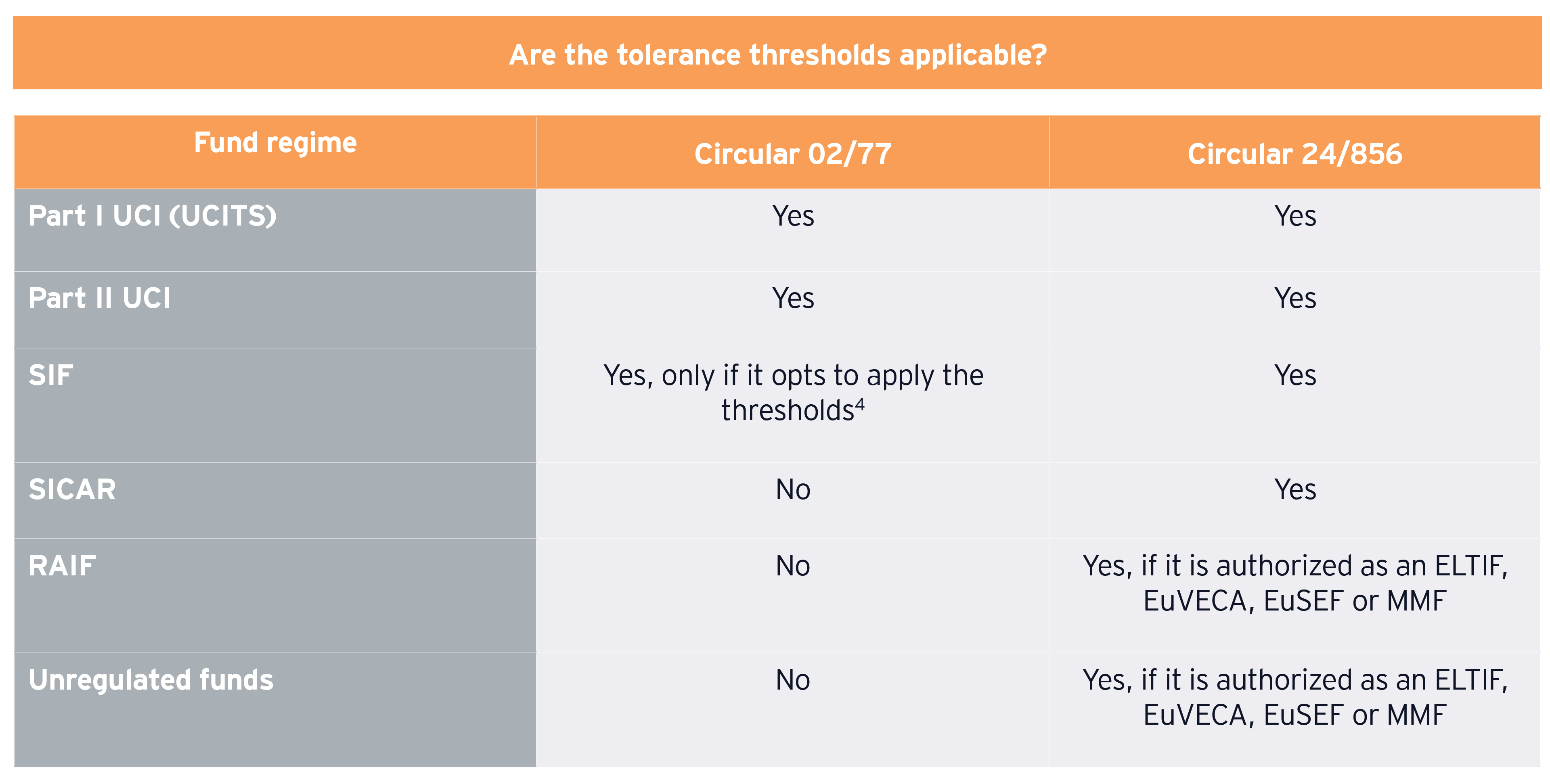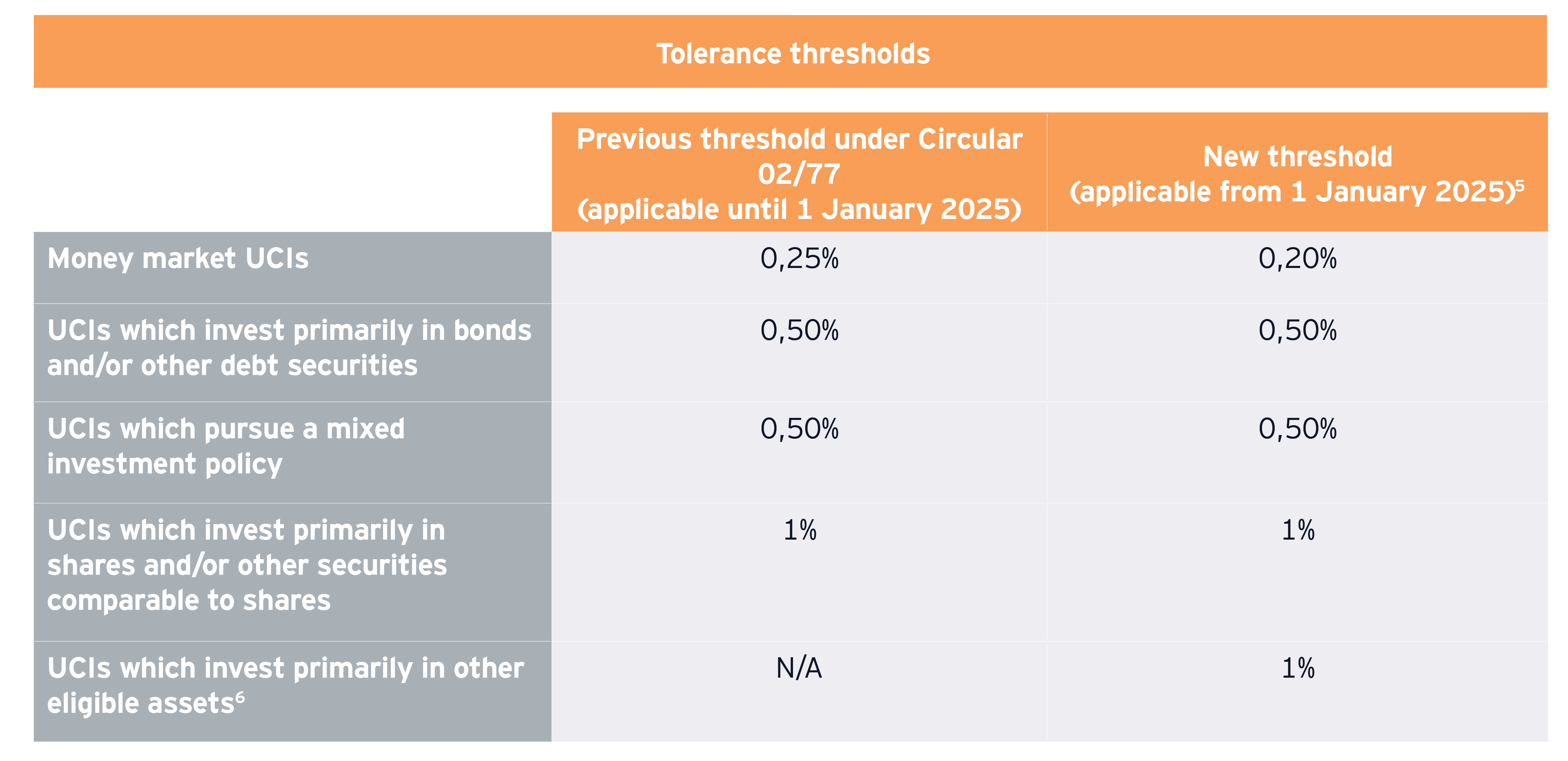EY refers to the global organization, and may refer to one or more, of the member firms of Ernst & Young Global Limited, each of which is a separate legal entity. Ernst & Young Global Limited, a UK company limited by guarantee, does not provide services to clients.

On 28 March 2024, the CSSF published Circular 24/856 (“the new Circular”) which will repeal CSSF Circular 02/77 from 1 January 2025. The new Circular, inter alia:
- Expands Circular 02/77 application scope
- Includes other types of errors, such as errors regarding the payment of costs/fees and swing pricing
- Consolidates in one single document the guidance given by the CSSF over the past years via channels such as its frequently asked questions document and annual reports
RAIFs and unregulated AIFs in scope
Circular 02/77 is applicable to UCITS, Part II UCIs and SIFs (unless specific rules are specified in the SIF’s internal procedures). Fund vehicles which do not require CSSF’s authorization (the so-called unregulated funds, i.e., RAIFs and AIFs which are not authorized as Part II UCI, SIF or SICAR) would fall out of the scope of 02/77.
The new Circular 24/856, in turn, has expanded the application scope by including not only UCITS, Part II UCIs and SIFs (in certain cases), but all SIFs, in addition to SICARs and every MMF, ELTIF, EuVECA and EuSEF independently whether they were set up as Part II UCIs, SIFs or SICARs or not (ie non regulated vehicles like RAIF). This way, for instance, an ELTIF-RAIF will now be required to comply with the Circular.1
Sponsors and promoters no longer in the focus
The new Circular clarifies the roles and obligations of the main stakeholders involved in the management and administration of UCIs. Instead of the former requirements to promoters/sponsors, the CSSF highlights that the dirigeants of UCIs in the case of investment companies or of IFMs (for UCIs set up in contractual form or for investment companies which have appointed an IFM) should ensure:
- The establishment of good organization in order to prevent to the extent possible the occurrence of errors/instances of non-compliance
- The compliance with the guidelines, as specified by the new Circular, in terms of handling these errors/ instances of non-compliance
- The relationships with the service providers involved in the operation of the UCI are covered by adequate arrangements (including contractual arrangements)
- The error/non-compliance is corrected, and any damage suffered by the UCI and/or its investors is compensated
The new Circular also clarifies the roles of administrators, depositaries and auditors:
- In the event of errors/non-compliance, the UCI administrator, in cooperation with other stakeholders, must also develop a remediation plan to be approved by the UCI or its IFM, implement related corrective measures and ensure that appropriate follow-up is carried out.2
- When the error/non-compliance concerns a UCITS or a Part II UCI and the total amount of compensation is greater than EUR 50,000 or the amount to be compensated for a single investor is greater than EUR 5,000, the auditor3 will be required to carry out an additional control and issue a special report.
- The UCI depositary must be informed of the occurrence of errors/non-compliance. Where the depositary notices errors/non-compliance before being notified, it is required to inform the UCI/IFM.
Note that whenever one of the UCI’s service providers (i.e., administrator, auditor or depositary) notifies the dirigeants of the UCI or of the IFM of an error/non-compliance and they do not follow up, the UCI service provider must notify the CSSF.
What changes in terms of NAV calculation errors for alternative funds and AIFMs?
NAV calculation errors occur when the NAV is deemed inaccurate. Under Circular 02/77, only UCITS and UCIs Part II were subject to the Circular’s requirements, meanwhile SIFs could opt to comply with the circular either with the standard or specific thresholds in their internal rules. The new Circular expands the requirements related to NAV calculation errors to SIFs, SICARs and to every MMF, ELTIF, EuVECA and EuSEF independently whether they were set up as Part II UCIs, SIFs or SICARs or not; with pre-established tolerance thresholds depending on the type of underlying assets (e.g. MMFs).


Under 02/77, SIFs were allowed to determine the tolerance threshold under its constitutional documents. The new Circular states that Part II UCIs and ELTIFs reserved to well-informed or professional investors, or SIFs following similar investment policies to those described in the table above, are expected to adopt similar thresholds to those in the table above.
Part II UCIs, ELTIFs reserved to well-informed or professional investors, SIFs, SICARs, EuVECAs and EuSEFs are, however, allowed to adopt a higher tolerance threshold up to a maximum of 5% of the NAV of the UCI. To do so, the UCI must perform and document a specific analysis taking into account the criteria set out below and must not set the tolerance threshold above those set out in the table above by default and without such analysis. The analysis should be made available to the CSSF upon request and take into account:
- Whether the UCI is open or closed-ended, and its frequency of subscription and redemption dealing
- The investment policy followed by the UCI as set out in its constitutional document/prospectus
- The nature of its investments (for example listed/unlisted securities)
- The risk profile of the UCI, including liquidity, market and credit risk as well as its volatility
- The valuation and investment policies of the UCI and anticipated investments
In addition to meeting the above criteria, the UCI’s investors must be made aware of the higher threshold via the usual means provided for by the UCI’s constitutional document/prospectus.
In instances of a UCI registered for distribution outside of Luxembourg, should the host country of distribution apply thresholds lower than those outlined in the new Circular by the CSSF, the UCI must apply the lower threshold at the level of the relevant sub-fund.
Errors regarding investment rules
The new Circular explains the difference between active and passive instances of non-compliance with investment rules. Instances of active non-compliance are defined as those resulting from:
- Voluntary acts or operations, mainly linked to investment/divestment decisions
- The absence of acts/operations when the non-compliance was avoidable and should have been able to be anticipated
These kinds of instance must be reported to the CSSF.
Both of the above can be caused by an intentional decision, an inadvertent error, human error or operational, technical or system-based weakness. Equally, the act/operation in question can derive from the dirigeants of the UCI, the IFM or from a delegate.
When correcting an instance of non-compliance with investment rules, UCIs must calculate the impact this breach has caused. For this, they can use either the accounting or the economic method to measure the impact:
- Accounting method: calculating the gain or loss realized in the accounting of the UCI in relation to non-compliance with the investment rule
- Economic method: comparing the financial impact of non-compliance calculated according to the accounting method with the performance that would have been achieved if the irregular investments had undergone the same variations as the portfolio invested in accordance with the investment policy and investment restrictions provided for by the applicable regulations and by the UCI’s constitutional documents or prospectus (“comparative reference”)
The accounting method should be the default method for measuring the impact of investment rules breaches. UCIs can, hence, use the economic method only if it is foreseen in the internal policies relating thereto and the comparative reference enables to determine a performance which is representative of the investment policy. Note that there is no tolerance threshold for instances of non-compliance with investment rules.
Other types of errors
The new Circular also mentions other types of errors:
Errors arising from incorrect application of anti-dilution tools (i.e., swing pricing)
With respect to errors arising from the incorrect application of anti-dilution tools, the UCI must be compensated for any loss suffered. Investors must be compensated if the tolerance thresholds have been breached.
Errors resulting from incorrect payment of costs/fees
The new Circular highlights that errors resulting from costs/fees which have been accrued but not paid should be dealt with in a similar manner to other NAV calculation errors. Regarding instances where costs/fees have been over-charged, invoiced and paid by the UCI in a manner that does not comply with the provisions set out in the UCI’s constitutional documents, prospectus or contractual agreements, no tolerance threshold is applicable for the compensation of the error. If the amount of compensation exceeds the tolerance threshold, the error must be corrected in a similar manner to other NAV calculation errors. If the UCI has under-paid a cost/fee, either the party responsible for the under-payment should compensate the third party to whom the payment was due, or in cases where the UCI decides to retroactively record the insufficient payment, the UCI must perform correction procedures including re-calculation of the NAV over the entire period of the under-payment without taking into account any tolerance threshold.
Cut-off errors
When the cut-off times outlined in a UCI’s constitutional document/prospectus have not been respected, the UCI must take corrective measures to ensure investors’ subscription/redemption orders have been carried out in accordance with such documents. All orders carried out at an incorrect NAV per share must be corrected, with no threshold being applied.
Investors having incurred losses must be indemnified. In cases where investors have benefitted from the cut-off error, well-informed/professional investors may be contacted in an attempt to reimburse the UCI. Any profit resulting from the error must remain with the UCI.
Investment allocation errors
In case of investment allocation errors, a UCI must be indemnified the amount of the loss suffered by the misallocation. If the loss results in a material NAV calculation error, it must be dealt with in accordance with chapter 4 of the new Circular (NAV calculation error). Any profit resulting from the misallocation must remain with the UCI.
What must IFMs/UCIs do in terms of error compensation?
When an error/non-compliance occurs at the level of a UCI and compensation is to be paid to investors, the UCI or its IFM must ensure that the final beneficiaries receive the compensation. For this reason, when using financial intermediaries, UCIs/IFMs must have in place the necessary arrangements to be able to look through the intermediation chain in order to be able to ensure the investor receives the due compensation. If this is not possible, the UCI must nevertheless ensure that all information related to the error/non-compliance is provided to the financial intermediaries to allow the financial intermediaries to proceed to the individual investor indemnification. In such cases the UCI must ensure that investors are informed in a clear manner, via the UCI’s prospectus, that their rights to indemnification when subscribing via financial intermediaries may be impacted.
The payment of compensation must not be spread over time or be deducted from future remuneration to which the party responsible for the error/non-compliance would be entitled. However, for the compensation of investors who still hold shares/units at the time of the payment of the compensation, UCIs may decide to allocate them additional shares/units instead of submitting the payment via bank transfer.
When UCIs/IFMs fail to pay former investors the compensation due, despite all the efforts to execute the payment, they are required to deposit it with the Caisse de Consignation.
Notification
Any error/non-compliance must be notified to the CSSF using the notification form which is provided for and made available on the CSSF website. The notification must be made within four to eight weeks maximum after the date of detection of the error/non-compliance. For more complex errors/instances of non-compliance involving multiple investors in a variety of jurisdictions, notification to the CSSF should be made as soon as possible, and not necessarily following the date of indemnification of investors.
When the error/non-compliance concerns a UCITS or a Part II UCI and the total amount of compensation is greater than EUR 50,000 or the amount to be compensated for a single investor is greater than EUR 5,000 the auditor will be required to issue a special report. The monetary thresholds outlined in CSSF Circular 02/77 (being EUR 25,000 and EUR 2,500 respectively) have therefore been doubled in the new Circular.
The special report must be transmitted to the CSSF within three months from submission of the notification form. The CSSF may issue further guidance in a frequently asked questions document to clarify elements of the new Circular.
Summary
On 28 March 2024, the CSSF published Circular 24/856 (“the new Circular”) which will repeal CSSF Circular 02/77 from 1 January 2025.

